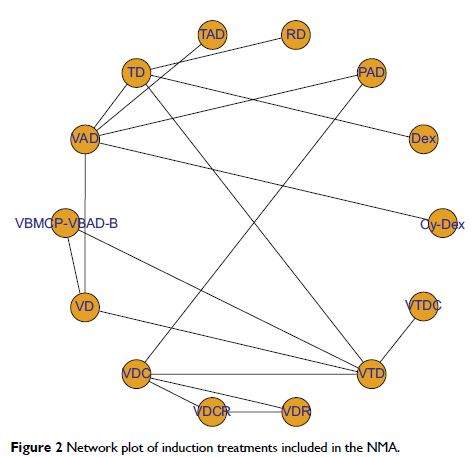109451
论文已发表
注册即可获取德孚的最新动态
IF 收录期刊
- 3.4 Breast Cancer (Dove Med Press)
- 3.2 Clin Epidemiol
- 2.6 Cancer Manag Res
- 2.9 Infect Drug Resist
- 3.7 Clin Interv Aging
- 5.1 Drug Des Dev Ther
- 3.1 Int J Chronic Obstr
- 6.6 Int J Nanomed
- 2.6 Int J Women's Health
- 2.9 Neuropsych Dis Treat
- 2.8 OncoTargets Ther
- 2.0 Patient Prefer Adher
- 2.2 Ther Clin Risk Manag
- 2.5 J Pain Res
- 3.0 Diabet Metab Synd Ob
- 3.2 Psychol Res Behav Ma
- 3.4 Nat Sci Sleep
- 1.8 Pharmgenomics Pers Med
- 2.0 Risk Manag Healthc Policy
- 4.1 J Inflamm Res
- 2.0 Int J Gen Med
- 3.4 J Hepatocell Carcinoma
- 3.0 J Asthma Allergy
- 2.2 Clin Cosmet Investig Dermatol
- 2.4 J Multidiscip Healthc

对新诊断为多发性骨髓瘤且适合接受移植的患者的诱导方案:随机对照试验的网络综合分析
Authors Zeng ZH, Chen JF, Li YX, Zhang R, Xiao L, Meng XY
Received 5 April 2017
Accepted for publication 22 June 2017
Published 10 July 2017 Volume 2017:9 Pages 287—298
DOI https://doi.org/10.2147/CMAR.S138932
Checked for plagiarism Yes
Review by Single-blind
Peer reviewers approved by Dr Akshita Wason
Peer reviewer comments 2
Editor who approved publication: Dr Antonella D'Anneo
Objective: The
aim of this study was to compare the early efficacy and survivals of induction
regimens for transplant-eligible patients with untreated multiple myeloma.
Materials and
methods: A comprehensive literature
search in electronic databases was conducted for relevant randomized controlled
trials (RCTs). Eligible studies were selected according to the predefined
selection criteria, before they were evaluated for methodological quality.
Basic characteristics and data for network meta-analysis (NMA) were extracted
from included trials and pooled in our meta-analysis. The end points were the
overall response rate (ORR), progression-free survival (PFS), and overall
survival (OS).
Results: A total of 14 RCTs that included 4,763 patients were analyzed. The
post-induction ORR was higher with bortezomib plus thalidomide plus
dexamethasone (VTD) regimens, and VTD was better than the majority of other
regimens. For OS, VTD plus cyclophosphamide (VTDC) regimens showed potential
superiority over other regimens, but the difference was not statistically
significant. The PFS was longer with thalidomide plus doxorubicin plus
dexamethasone (TAD) regimens for transplant-eligible patients with newly
diagnosed multiple myeloma (NDMM).
Conclusion: The NMA demonstrated that the VTD, VTDC, and TAD regimens are most
beneficial in terms of ORR, OS, and PFS for transplant-eligible patients with
NDMM, respectively.
Keywords: multiple myeloma, newly diagnosed, transplant-eligible, induction
therapies, network meta-analysis
